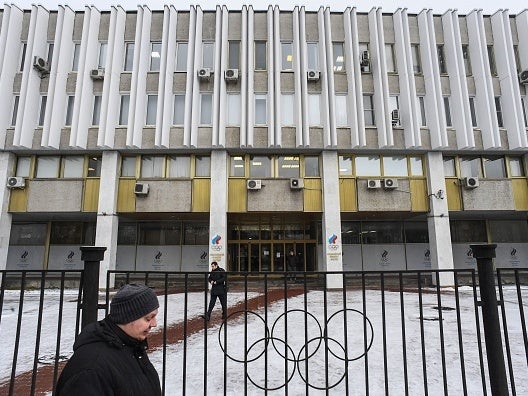Wada was ‘not equipped’ to deal with ‘unprecedented’ Russian doping scandal, admits president Craig Reedie
The outgoing chief said the affair was ‘the worse case of system failure’ during his tenure

Your support helps us to tell the story
From reproductive rights to climate change to Big Tech, The Independent is on the ground when the story is developing. Whether it's investigating the financials of Elon Musk's pro-Trump PAC or producing our latest documentary, 'The A Word', which shines a light on the American women fighting for reproductive rights, we know how important it is to parse out the facts from the messaging.
At such a critical moment in US history, we need reporters on the ground. Your donation allows us to keep sending journalists to speak to both sides of the story.
The Independent is trusted by Americans across the entire political spectrum. And unlike many other quality news outlets, we choose not to lock Americans out of our reporting and analysis with paywalls. We believe quality journalism should be available to everyone, paid for by those who can afford it.
Your support makes all the difference.Outgoing World Anti-Doping Agency president Craig Reedie said on Tuesday the scale and size of the Russian doping scandal that erupted in 2015 had overwhelmed his organisation at the time.
Speaking at the World Conference on doping in sport, Reedie said the Russian doping affair that emerged ahead of the 2016 Rio de Janeiro Olympics and saw the involvement of a vast number of athletes, coaches and officials was the biggest challenge WADA had faced in its 20-year existence.
“The worst case of system failure in my time as president of WADA or in the entire time of the anti-doping movement is Russia,” Reedie told the conference.
He said the level of cheating was “unprecedented,” leaving WADA under mounting pressure to work for all clean athletes as the Russian anti-doping agency (RUSADA) was declared non-compliant.
“What it (scandal) taught us when it erupted was that we were not equipped to deal with such a large-scale programme,” Reedie said.
Rusada was suspended after the 2015 Wada report found evidence of state-sponsored doping in Russian sport and the country was barred from the Rio de Janeiro Olympics the following year.
All Russian athletes also competed as independents at the 2018 Pyeongchang Winter Olympics.
Rusada’s suspension was lifted in September 2018 amid strong criticism as WADA gradually got access to key Russian athletes’ data from the Russian lab.
But in September Wada said it had again opened compliance proceedings against Rusada after finding “inconsistencies” in the vast bank of historical testing data finally handed over in January.

That means Rusada are again at risk of being declared non-compliant and thus putting Russia’s participation at the Tokyo Olympics next year at risk.
Reedie did not say when a decision on this matter will be taken.
“Clearly we have all faced pressures to deal with the Russian situation effectively,” said Reedie, who will be replaced by Poland’s sports minister Witold Banka on Jan. 1.
“Athletes expect us in Wada to step up the fight. They expect the rules to be enforced.”
Reuters
Join our commenting forum
Join thought-provoking conversations, follow other Independent readers and see their replies
Comments